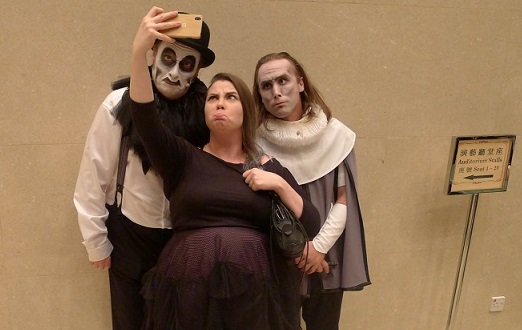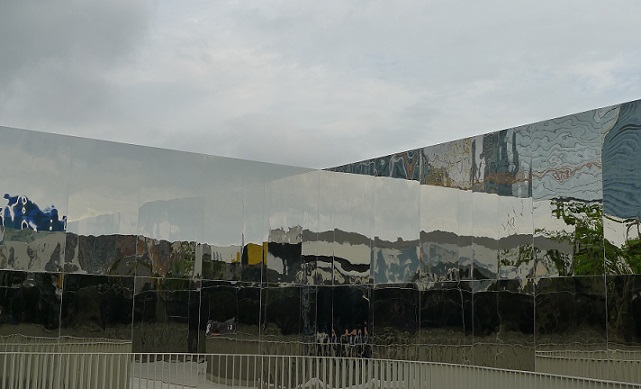藝術議題
- 威尼斯雙年展最新的專題文章如下。如欲閱讀有關同一議題的其他文章,可再點擊右下角資料庫的年份和月份。
莎士比亞的靈感 ∣ Shakespeare's Inspiration
約翰百德 (John BATTEN)
at 12:01pm on 27th September 2016


Captions:
1. 虎百合在香港演出後與戲迷拍照 ∣ The Tiger Lillies (the group's composer, Martyn Jacques, on left) having a selfie taken with a fan after their Hong Kong concert
2. M+ 展亭內的曾建華作品,庭園的反射鏡像 ∣ Tsang Kin-wah’s reflected mirrored courtyard inside the M+ Pavilion
(Please scroll down for English version)
立法會選舉的六天後,即朱凱迪和另外兩名立法會議員報稱受到恐嚇和暴力威脅的那個星期,我欣賞了一部精彩的「多媒體音樂劇」,劇目是莎士比亞的《王子復仇記》,由三人樂隊虎百合和來自丹麥共和劇團的一眾演員在葵青劇院演出。莎士比亞的《王子復仇記》是一部關於謀殺、瘋癲、政治陰謀和野心的話劇,正正反映了香港現時的政治形勢。
面對立法會有可能出現更多拉布,加上政府與立法機關繼續互不信任,有說議會將面臨更多難關。我並不這樣認為。於我而言,新任議員將帶來議會亟需的魄力、紀律和對立法會工作的新思維。當上屆議員很多時只有高呼、尖叫,或勞累怠倦,但多位新任議員已承諾將努力分析和研究政府的政策和香港的社會及政治問題。
《王子復仇記》是一部妙不可言的製作,它前衛而發人深省,配上中英文字幕,完全可以看懂。虎百合被形容為「陰沉、怪異和變化多端,有時令人深感悲痛,有時無情挑釁,也有時美不勝收。」聽上去真像香港的政治!我認為新議員會像這部劇場製作一樣 ,會和市民對話,聽取市民的意見,然後以創意及挑戰,為改善香港帶來驚喜。否則,就像虎百合唱出自己版本的《王子復仇記》:「過這種生活有何意思?…/ 它有什麼意思、用處和目標? / 它要往哪裡去?每人都擔演自己的角色? / 憑著自我奮鬥,爭取凱旋、爭取勝利 / 為了財富、為了權力犯下任何罪惡。」
西九文化區最近剛開幕的M+ 展亭,也從莎士比亞取得靈感。展亭位於興建中的M+主建築物旁,是文化區內首個運作的場館,現時正舉辦開幕展覽《無》,是一個新委約的多媒體及錄像投映裝置作品,是2015年威尼斯雙年展香港代表曾建華的傑作。
然而,到展亭參觀的人士不會看到建築師(彭耀輝建築師事務所有限公司、JET建築事務所和張勵繡)對M+ 展亭的設計原意。曾建華採取了嬉笑怒罵和顛覆的態度,撕毀了展亭內的草地,讓它只餘一片荒土。而展亭「可以看到香港廣闊天際線景致的升高室外平台」現在被曾建華的鏡像圍欄阻檔,類似展亭的「鏡像外牆」。改動在展牆正中造出了一個圍封、被鏡子包圍,像監獄一樣的庭院。策展人鄭道鍊一點不帶諷刺地表示,曾建華「無懼全新的M+展亭展場的結構,聰明和大膽地把展亭的空間擴展和徹底的改變」。
然而,展亭的建築師應該不會對曾建華的改變感到太震驚;說到底,它是一個藝術空間,很多時候,藝術家都會有意地因著本身的藝術理由改變空間建築。建築師的原意,是「運用鏡面外牆,反映周邊園林,把建築主體融入自然環境中。」諷刺的是,建築師和曾建華,在曾氏的建築介入後,對這個戶外範圍有著相近的視覺意念。
曾建華在《無》中引用了莎士比亞《馬克白》的對白:「人生不過是一個行走的影子,一個在舞台上指手劃腳的拙劣伶人,登場片刻,就在無聲中悄然退下;它是個愚人所講的故事,充滿著喧嘩和騷動,卻找不到一點意義。」(第五幕,第五場,第24至28行)。 在他的展覽中,曾建華像莎士比亞一樣對生命、行動、高低浮沉等提出疑問,然後所有都逃不過死亡,最後一切歸於無。
曾建華的裝置有一道擋住小庭園的牆,創造出一個圍封的鏡像空間,在鏡反照鏡下,四周環境無窮無盡地反映。作品讓我想起偉大的澳洲漫畫家米高.羅尼格,他在1980年代觀察了高樓大廈的首個鏡像幕牆後,在一幅漫畫中描劃了墨爾本不斷轉變的天際線,只使用了建築物的邊緣線條,中間全部留白:每座大廈之間只剩虛無。同樣地,新落成的M+ 展亭中間,互相反彈的鏡像也只剩虛無。
Translated from English by Aulina Chan
Shakespeare's Inspiration (Tsang Kin-wah's Nothing at M+ Pavilion & The Tiger Lillies' Hamlet)
John Batten
Exactly six days after the Legislative Council elections, and during the week in which Chu Hoi-dick and two other legislators reported being intimidated and threatened with violence, I went to a marvellous ‘multimedia musical’ theatre performance of William Shakespeare’s Hamlet performed by the 3-person band The Tiger Lillies and a troupe of actors from the Theatre Republique of Denmark at Kwai Tsing Theatre. Shakespeare’s Hamlet is a play of murder, madness, political intrigue and ambition and fits perfectly into Hong Kong’s current political situation.
With the possibility of more filibustering in the Legislative Council and continuing distrust between the government and the legislature, there have been predictions of calamity. I don’t believe it. I actually think the new legislators will bring much-needed vigour, discipline and a new intelligence to the work of the Legislative Council. Many of the new legislators have committed themselves to the hard work of analyzing and researching government policies and Hong Kong’s social and political issues, whereas many of the previous legislators just yelled and screamed or were tired and worn-out.
It was a marvelous production of Hamlet; it was avant-garde and thought provoking – and completely understandable with English and Chinese surtitles. The Tiger Lillies have been described as “dark, peculiar, and varied, with moments of deep sadness, ruthless provocation and immense beauty.” This sounds similar to Hong Kong politics! And, I think – like this theatre production - the new legislators will be talking and listening to all us and will surprise in their innovative challenges to improve Hong Kong. Or else, as The Tiger Lillies sang in their version of Hamlet: “What is the point of this life we lead?.../ What is the point, its purpose, its goal / Where is it going, each one plays its role / Striving with ego, with triumph to win / For wealth and for power commit any sin.”
Shakespeare is also inspirational at the new M+ Pavilion in the West Kowloon Cultural District, which has just opened. Sited next to the main M+ building now under construction, the Pavilion is the first functioning venue in the arts district and currently hosts its inaugural exhibition, Nothing, a newly commissioned installation with multimedia and video projections by Tsang Kin-wah, Hong Kong’s representative at the 2015 Venice Biennale.
However, visitors to the Pavilion won’t be able to see how the architects (VPANG architects, JET Architecture, Lisa Cheung) intended the M+ Pavilion to look. Tsang has been cheeky and subversive by ripping up the Pavilion’s internal grassy space and leaving it as desolate, bare soil. And, the Pavilion’s “elevated outdoor terrace with expansive views of the Hong Kong skyline” is now blocked off by Tsang using mirrored ‘fencing’ similar to the Pavilion’s “mirrored external walls.” This creates an enclosed, mirrored, prison-like courtyard in the middle of the venue. Without a touch of irony, curator Doryun Chong says that Tsang was “undaunted by the brand-new M+ Pavilion structure and brought his typical ingenuity and daring to extend it and completely transform it.”
The Pavilion’s architects, however, should not be too shocked by Tsang’s changes; it is, after all, an arts space and at times artists may intentionally alter the architecture for their own artistic reasons. The architects’ original intention is for the “mirrored external walls (to) camouflage the architecture, reflecting the surrounding expanses of greenery and immersing the building within its Park setting.” Ironically, the architects and Tsang, after his architectural intervention, have similar visual intentions for this outdoor area.
In Nothing, Tsang quotes from William Shakespeare’s ‘Macbeth’: “Life’s but a walking shadow, a poor player / That struts and frets his hour upon the stage / And then is heard no more: it is a tale / Told by an idiot, full of sound and fury, / Signifying nothing.” (Act V, scene V, 24-28). In his exhibition, like Shakespeare, Tsang questions life, its actions, its highs and lows, all reduced by the inevitability of death; then: nothing.
Tsang’s wall blocking off the terrace and creating an enclosed mirrored space has created surroundings that are endlessly reflected: mirrors reflecting mirrors. It reminds me of the great Australian cartoonist, Michael Leunig, who on observing the first mirrored curtain walls on high-rise buildings in the 1980s, depicted the changing Melbourne skyline in a cartoon by drawing only the lined edges of buildings, and in-between was a reflected emptiness: ‘nothing’ between each building. Likewise, the bouncing mirrored images in the middle of the new M+ Pavilion are nothing.
Links for further information:
Tigerlillies
Tsang Kin-wah: Nothing Exhibition @ M+ Pavilion
This article was originally published in Ming Pao Weekly on 1 October 2016.
1. 虎百合在香港演出後與戲迷拍照 ∣ The Tiger Lillies (the group's composer, Martyn Jacques, on left) having a selfie taken with a fan after their Hong Kong concert
2. M+ 展亭內的曾建華作品,庭園的反射鏡像 ∣ Tsang Kin-wah’s reflected mirrored courtyard inside the M+ Pavilion
(Please scroll down for English version)
立法會選舉的六天後,即朱凱迪和另外兩名立法會議員報稱受到恐嚇和暴力威脅的那個星期,我欣賞了一部精彩的「多媒體音樂劇」,劇目是莎士比亞的《王子復仇記》,由三人樂隊虎百合和來自丹麥共和劇團的一眾演員在葵青劇院演出。莎士比亞的《王子復仇記》是一部關於謀殺、瘋癲、政治陰謀和野心的話劇,正正反映了香港現時的政治形勢。
面對立法會有可能出現更多拉布,加上政府與立法機關繼續互不信任,有說議會將面臨更多難關。我並不這樣認為。於我而言,新任議員將帶來議會亟需的魄力、紀律和對立法會工作的新思維。當上屆議員很多時只有高呼、尖叫,或勞累怠倦,但多位新任議員已承諾將努力分析和研究政府的政策和香港的社會及政治問題。
《王子復仇記》是一部妙不可言的製作,它前衛而發人深省,配上中英文字幕,完全可以看懂。虎百合被形容為「陰沉、怪異和變化多端,有時令人深感悲痛,有時無情挑釁,也有時美不勝收。」聽上去真像香港的政治!我認為新議員會像這部劇場製作一樣 ,會和市民對話,聽取市民的意見,然後以創意及挑戰,為改善香港帶來驚喜。否則,就像虎百合唱出自己版本的《王子復仇記》:「過這種生活有何意思?…/ 它有什麼意思、用處和目標? / 它要往哪裡去?每人都擔演自己的角色? / 憑著自我奮鬥,爭取凱旋、爭取勝利 / 為了財富、為了權力犯下任何罪惡。」
西九文化區最近剛開幕的M+ 展亭,也從莎士比亞取得靈感。展亭位於興建中的M+主建築物旁,是文化區內首個運作的場館,現時正舉辦開幕展覽《無》,是一個新委約的多媒體及錄像投映裝置作品,是2015年威尼斯雙年展香港代表曾建華的傑作。
然而,到展亭參觀的人士不會看到建築師(彭耀輝建築師事務所有限公司、JET建築事務所和張勵繡)對M+ 展亭的設計原意。曾建華採取了嬉笑怒罵和顛覆的態度,撕毀了展亭內的草地,讓它只餘一片荒土。而展亭「可以看到香港廣闊天際線景致的升高室外平台」現在被曾建華的鏡像圍欄阻檔,類似展亭的「鏡像外牆」。改動在展牆正中造出了一個圍封、被鏡子包圍,像監獄一樣的庭院。策展人鄭道鍊一點不帶諷刺地表示,曾建華「無懼全新的M+展亭展場的結構,聰明和大膽地把展亭的空間擴展和徹底的改變」。
然而,展亭的建築師應該不會對曾建華的改變感到太震驚;說到底,它是一個藝術空間,很多時候,藝術家都會有意地因著本身的藝術理由改變空間建築。建築師的原意,是「運用鏡面外牆,反映周邊園林,把建築主體融入自然環境中。」諷刺的是,建築師和曾建華,在曾氏的建築介入後,對這個戶外範圍有著相近的視覺意念。
曾建華在《無》中引用了莎士比亞《馬克白》的對白:「人生不過是一個行走的影子,一個在舞台上指手劃腳的拙劣伶人,登場片刻,就在無聲中悄然退下;它是個愚人所講的故事,充滿著喧嘩和騷動,卻找不到一點意義。」(第五幕,第五場,第24至28行)。 在他的展覽中,曾建華像莎士比亞一樣對生命、行動、高低浮沉等提出疑問,然後所有都逃不過死亡,最後一切歸於無。
曾建華的裝置有一道擋住小庭園的牆,創造出一個圍封的鏡像空間,在鏡反照鏡下,四周環境無窮無盡地反映。作品讓我想起偉大的澳洲漫畫家米高.羅尼格,他在1980年代觀察了高樓大廈的首個鏡像幕牆後,在一幅漫畫中描劃了墨爾本不斷轉變的天際線,只使用了建築物的邊緣線條,中間全部留白:每座大廈之間只剩虛無。同樣地,新落成的M+ 展亭中間,互相反彈的鏡像也只剩虛無。
Translated from English by Aulina Chan
Shakespeare's Inspiration (Tsang Kin-wah's Nothing at M+ Pavilion & The Tiger Lillies' Hamlet)
John Batten
Exactly six days after the Legislative Council elections, and during the week in which Chu Hoi-dick and two other legislators reported being intimidated and threatened with violence, I went to a marvellous ‘multimedia musical’ theatre performance of William Shakespeare’s Hamlet performed by the 3-person band The Tiger Lillies and a troupe of actors from the Theatre Republique of Denmark at Kwai Tsing Theatre. Shakespeare’s Hamlet is a play of murder, madness, political intrigue and ambition and fits perfectly into Hong Kong’s current political situation.
With the possibility of more filibustering in the Legislative Council and continuing distrust between the government and the legislature, there have been predictions of calamity. I don’t believe it. I actually think the new legislators will bring much-needed vigour, discipline and a new intelligence to the work of the Legislative Council. Many of the new legislators have committed themselves to the hard work of analyzing and researching government policies and Hong Kong’s social and political issues, whereas many of the previous legislators just yelled and screamed or were tired and worn-out.
It was a marvelous production of Hamlet; it was avant-garde and thought provoking – and completely understandable with English and Chinese surtitles. The Tiger Lillies have been described as “dark, peculiar, and varied, with moments of deep sadness, ruthless provocation and immense beauty.” This sounds similar to Hong Kong politics! And, I think – like this theatre production - the new legislators will be talking and listening to all us and will surprise in their innovative challenges to improve Hong Kong. Or else, as The Tiger Lillies sang in their version of Hamlet: “What is the point of this life we lead?.../ What is the point, its purpose, its goal / Where is it going, each one plays its role / Striving with ego, with triumph to win / For wealth and for power commit any sin.”
Shakespeare is also inspirational at the new M+ Pavilion in the West Kowloon Cultural District, which has just opened. Sited next to the main M+ building now under construction, the Pavilion is the first functioning venue in the arts district and currently hosts its inaugural exhibition, Nothing, a newly commissioned installation with multimedia and video projections by Tsang Kin-wah, Hong Kong’s representative at the 2015 Venice Biennale.
However, visitors to the Pavilion won’t be able to see how the architects (VPANG architects, JET Architecture, Lisa Cheung) intended the M+ Pavilion to look. Tsang has been cheeky and subversive by ripping up the Pavilion’s internal grassy space and leaving it as desolate, bare soil. And, the Pavilion’s “elevated outdoor terrace with expansive views of the Hong Kong skyline” is now blocked off by Tsang using mirrored ‘fencing’ similar to the Pavilion’s “mirrored external walls.” This creates an enclosed, mirrored, prison-like courtyard in the middle of the venue. Without a touch of irony, curator Doryun Chong says that Tsang was “undaunted by the brand-new M+ Pavilion structure and brought his typical ingenuity and daring to extend it and completely transform it.”
The Pavilion’s architects, however, should not be too shocked by Tsang’s changes; it is, after all, an arts space and at times artists may intentionally alter the architecture for their own artistic reasons. The architects’ original intention is for the “mirrored external walls (to) camouflage the architecture, reflecting the surrounding expanses of greenery and immersing the building within its Park setting.” Ironically, the architects and Tsang, after his architectural intervention, have similar visual intentions for this outdoor area.
In Nothing, Tsang quotes from William Shakespeare’s ‘Macbeth’: “Life’s but a walking shadow, a poor player / That struts and frets his hour upon the stage / And then is heard no more: it is a tale / Told by an idiot, full of sound and fury, / Signifying nothing.” (Act V, scene V, 24-28). In his exhibition, like Shakespeare, Tsang questions life, its actions, its highs and lows, all reduced by the inevitability of death; then: nothing.
Tsang’s wall blocking off the terrace and creating an enclosed mirrored space has created surroundings that are endlessly reflected: mirrors reflecting mirrors. It reminds me of the great Australian cartoonist, Michael Leunig, who on observing the first mirrored curtain walls on high-rise buildings in the 1980s, depicted the changing Melbourne skyline in a cartoon by drawing only the lined edges of buildings, and in-between was a reflected emptiness: ‘nothing’ between each building. Likewise, the bouncing mirrored images in the middle of the new M+ Pavilion are nothing.
Links for further information:
Tigerlillies
Tsang Kin-wah: Nothing Exhibition @ M+ Pavilion
This article was originally published in Ming Pao Weekly on 1 October 2016.
